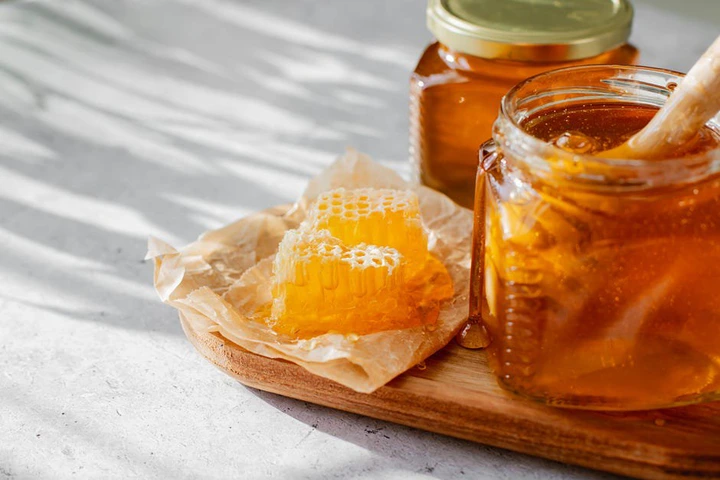Is Honey Actually Good for You? Here’s Everything You Need to Know About This Sugar Substitute
Honey has long been considered a natural sweetener, often promoted as a healthier alternative to refined sugar. But with all the different opinions about its health benefits, you may be wondering: is honey actually good for you? To answer that question, let’s dive into the science behind honey and explore its potential health benefits, its nutritional content, and when it’s best to enjoy it.
The Nutritional Profile of Honey
One of the key reasons why honey is considered healthier than sugar is because of its unique composition. Honey contains:
- Fructose and glucose, two types of sugar, which provide a quick energy boost.
- Antioxidants, such as flavonoids and phenolic compounds, which help combat free radicals in the body.
- Trace vitamins and minerals, including B vitamins, vitamin C, calcium, iron, and magnesium. While these are in small amounts, they add some nutritional value compared to refined sugar, which has no vitamins or minerals.
A tablespoon of honey (about 21 grams) contains approximately 64 calories, which is a bit higher than refined sugar, but its nutritional benefits might make it a more appealing option in moderation.
Health Benefits of Honey
1. Rich in Antioxidants
Honey is packed with antioxidants, which help protect your body from oxidative stress and inflammation. Studies have shown that dark-colored honey, such as buckwheat honey, contains higher levels of antioxidants. Regular consumption of honey might help reduce the risk of chronic diseases like heart disease, cancer, and diabetes.
2. Soothes Sore Throats and Coughs
Honey has long been a natural remedy for sore throats and coughs. Its soothing properties can provide relief and even help reduce coughing, especially in children. Some research suggests that honey may be as effective as over-the-counter cough medicines in reducing cough frequency and severity.
3. Supports Digestive Health
Honey has prebiotic properties, meaning it helps promote the growth of good bacteria in your gut. These beneficial bacteria are essential for proper digestion and overall gut health. A healthy gut can boost your immune system, improve nutrient absorption, and even influence your mood.
4. May Improve Skin Health
Honey is often used in skincare products due to its natural humectant properties, which means it helps retain moisture. Applying honey topically can help treat dry skin, acne, and other skin conditions. Its antibacterial properties also help prevent infections and promote faster healing of wounds.
5. Helps Regulate Blood Sugar
While honey is still a form of sugar, it has a lower glycemic index (GI) than refined sugar, meaning it may have a slower, less dramatic impact on blood sugar levels. This can be beneficial for people looking to control their blood sugar, though moderation is still key.
Is Honey Healthier Than Sugar?
While honey does offer more nutrients than refined sugar, it’s important to remember that it’s still a form of sugar. Both honey and refined sugar can lead to weight gain and other health issues if consumed in excess. The difference lies in the fact that honey offers some additional health benefits due to its antioxidant content and trace nutrients. However, consuming honey in large amounts can still contribute to elevated blood sugar levels, which can be a concern for people with diabetes.
How to Incorporate Honey into Your Diet
Honey can be used in various ways to enhance the flavor of your foods and drinks. Here are a few ideas on how to incorporate it into your daily routine:
- As a sweetener in beverages: Add honey to tea, coffee, or smoothies for a natural sweetness.
- On toast or oatmeal: Spread honey on your morning toast or mix it into your oatmeal.
- In baking: Use honey as a substitute for sugar in many recipes.
- As a topping: Drizzle honey over yogurt, fruits, or pancakes for a naturally sweet touch.
When to Be Cautious About Honey
Though honey is generally safe for most people, there are a few situations where caution is needed:
- Infants under 1 year: Honey should not be given to babies under one year old due to the risk of botulism, a rare but serious illness caused by bacterial spores that can be present in honey.
- Allergies: Some individuals may be allergic to honey or the pollen it contains. If you have allergies to bee stings or pollen, it’s best to consult your doctor before consuming honey.
Conclusion
Honey is much more than just a sweet treat. It offers several health benefits, including antioxidants, digestive support, and skin healing properties, making it a great natural alternative to refined sugar. However, it’s important to remember that honey is still a sugar, and moderation is key to reaping its benefits without going overboard on calories or sugar. As with anything, balance is crucial when it comes to enjoying honey as part of a healthy diet.
